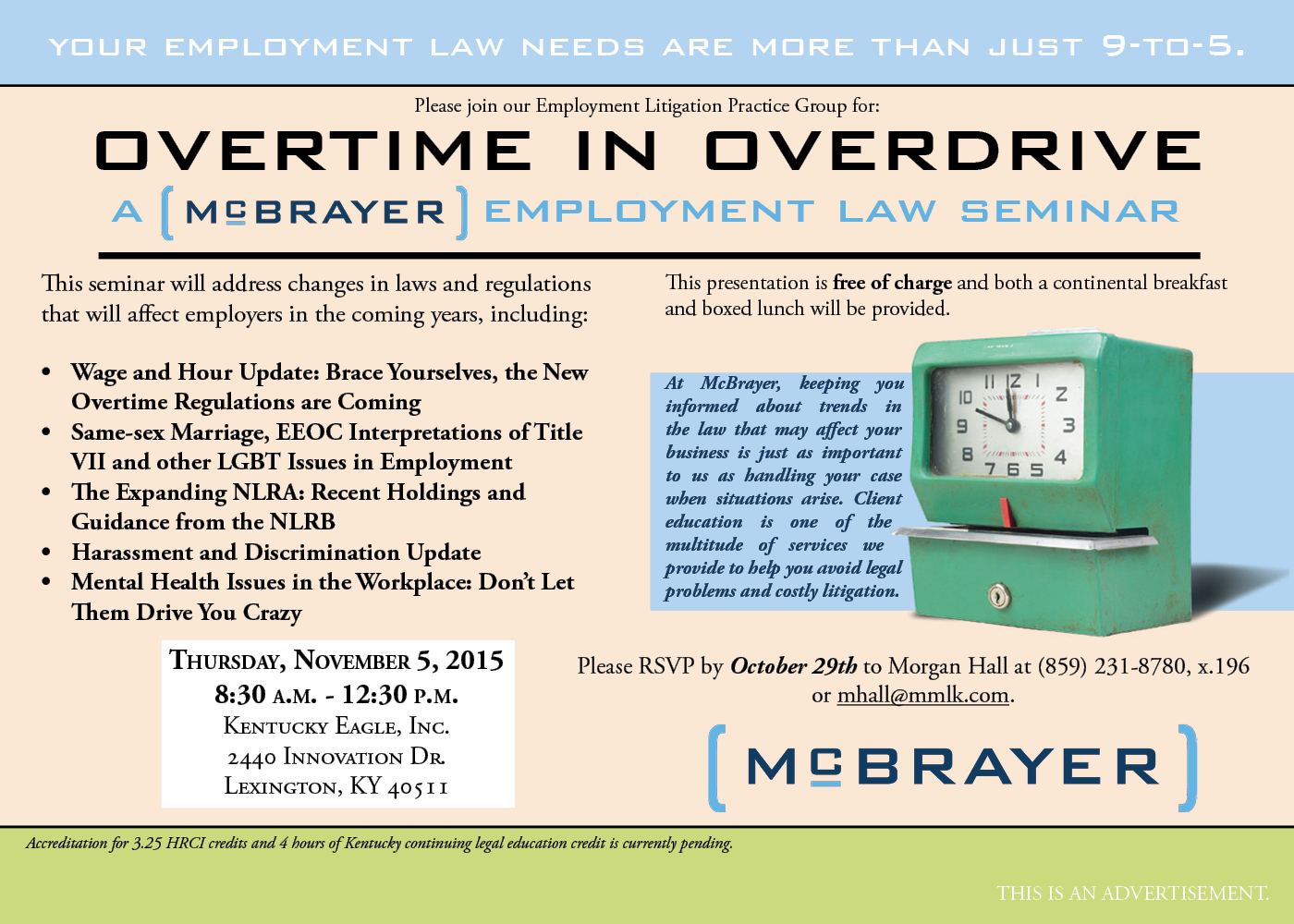Contact Us
Categories
- FTC
- Emotional Support Animals
- Service Animals
- Employee Agreement
- Remote Work
- Federal Trade Commission
- LGBTQ
- Minors
- United States Department of Justice ("DOJ")
- Arbitration
- Work from Home
- Workplace health
- Intellectual Property
- Trade Secrets
- Corporate
- Center for Disease Control
- Americans with Disabilities Act ("ADA")
- FFCRA
- Opioid Epidemic
- Occupational Safety and Health Administration (“OSHA”)
- COVID-19
- Families First Coronavirus Response Act
- H.R.6201
- Health Care Law
- IRS
- Paid Sick Leave
- Temporary Leave
- Treasury
- Coronavirus
- Worker Misclassification
- Labor Law
- Overtime
- Kentucky Unemployment Insurance Commission
- Sexual Harassment
- FMLA Retaliation
- Overtime Rule
- Employer Wellness Programs
- Genetic Information Nondiscrimination Act ("GINA")
- Kentucky minimum wage
- Minimum wage
- Wage and Hour
- Employee Benefits
- Employment Discrimination Laws
- Employment Non-Discrimination Act ("ENDA")
- ERISA
- Human Resource Department
- Independent Contractors
- Kentucky Civil Rights Act (“KCRA”)
- OSHA
- Overtime Pay
- Paid Time Off ("PTO")
- Sick Employees
- ADA Amendments Act of 2008 (“ADAAA”)
- Adverse Employment Action
- Americans with Disabilities Act
- Bring Your Own Device
- BYOD
- Civil Rights
- Compliance
- Department of Labor ("DOL")
- EEOC
- Employee Handbook
- Employee Misconduct
- Employment Law
- Fair Labor Standards Act (FLSA)
- Family and Medical Leave Act (“FMLA”)
- National Labor Relations Act (NLRA)
- National Labor Relations Board (NLRB)
- Pregnancy Discrimination Act
- Social Media
- Social Media Policies
- Title VII of the 1964 Civil Rights Act
- U.S. Department of Labor
- U.S. Equal Employment Opportunity Commission (“EEOC”)
- Uncategorized
- Union
- Volunteer
- Young v. UPS
- Amazon
- Department of Health and Human Services
- Federal contractors
- Kentucky Labor Cabinet’s Occupational Safety and Health Program (KOSH)
- Micro-unit
- Portal-to-Portal Act of 1947
- Security Checks
- Security Screening
- Specialty Healthcare & Rehabilitation Center of Mobile
- U.S. Supreme Court
- Cloud
- Creech v. Brown
- EEOC v. Hill Country Farms
- Equal Employment Opportunity Commission v. Kaplan Higher Education Corp.
- Lane v. Franks
- Mine Safety and Health Administration ("MSHA")
- Non-exempt employees
- Northwestern
- Shazor v. Prof’l Transit Mgmt.
- Web Content Accessibility Guidelines
- Whistleblower
- "Ban-the-box"
- 2013)
- At-will employment
- Berrier v. Bizer
- Bullying
- Chapter 11 Bankruptcy
- Chenzira v. Cincinnati Children’s Hospital Medical Center
- Citizens United v. Federal Election Commission
- Companionship services
- Compensatory time off
- Conestoga Woods Specialties v. Sebelius
- Consumer Credit Protection Act (“CCPA”)
- Crystalline Silica
- Davis-Bacon and Related Acts
- Drug-Free Workplaces
- Earnings
- EEOC v. Fabricut
- EEOC v. The Founders Pavilion
- Ehling v. Monmouth-Ocean Hospital Service Corp.
- Federal Stored Communications Act (“SCA”)
- Giant Food LLC
- Government employees
- Government shutdown
- Home Health Care Workers
- Illness and Injury Reports
- Job applications
- Jury duty
- Kentucky Department of Workers’ Claims
- Kentucky Wage and Hour Act
- KYSHRM 2013
- Mandatory vaccination policies
- Maternity Leave
- McNamara O’Hara Service Contract Act
- Medical Exams
- NFL Bullying Scandal
- Payroll
- Permissible Exposure Level ("PEL")
- Private employers
- Sebelius v. Hobby Lobby Stores
- Senate Bill 157
- SHRM
- Small Business Administration (SBA)
- Violence
- Wage garnishment
- WorkSmart Kentucky
- COBRA
- Contraceptive Mandate
- Defamation
- Defense of Marriage Act (“DOMA”)
- Employee Forms
- Employee Hazards
- Employee of the Month Programs
- Employee photographs
- Employee Training
- Employer Group Health Plans
- Employer Mandate
- Employment Practices Liability Insurance
- Endorsements
- Federal Workplace Agencies
- FICA
- Form I-9
- Freedom of Speech
- Gatto v. United Airlines and allied Aviation Services
- Health-Contingent Wellness Programs
- HIPAA
- House Labor and Industry Committee
- KRS 391.170
- Litigation
- Madry v. Gibraltar National Corporation
- Megivern v. Glacier Hills Incorporated
- Motivating Factor
- Obesity
- Online Account Protection
- Online Defamation
- Participatory Wellness Programs
- Patient Protection and Affordable Care Act
- Pennington v. Wagner’s Pharmacy
- Pension Plans
- Play or Pay
- Record Retention
- Reference checks
- Religious Employer
- Right to Work Bill
- Sequester
- Severance Pay
- Social Media Ownership
- Supervisor
- Supplemental Unemployment Compensation Benefits
- Tangible employment actions
- Tax Refund
- Telecommuting
- Title VII retaliation cases
- Troyer v. T.John.E Productions
- U.S. Citizenship and Immigration Services
- Unfair Labor Practice
- United States v. Quality Stores
- United States v. Windsor
- University of Texas Southwestern Medical Center v. Nassar
- Vance v. Ball State University
- Crisis Management
- Employee Arrests
- Job Description
- Job Requirement
- Kentucky’s Whistleblower Act
- Labor and Pensions ("HELP")
- Municipal Liability
- PhoneDog v. Kravitz
- Posting Requirements
- Public Sector Liability
- Social Networking Online Protection Act (SNOP)
- Social Privacy Laws
- Strategic Enforcement Plan (SEP)
- White v. Baptist Memorial Health Care Corp.
- Wilson v. City of Central City
- Workplace Politics
- Class Action Waivers
- Criminal Background Checks
- Employee Performance Reviews
- Employee Personnel Files
- Federal Arbitration Act (FAA)
- Federal Department of Labor
- Hiring and Firing
- Hosanna-Tabor Opinion
- Informal Discussion Letter (“EEOC Letter”)
- Kentucky Labor Cabinet
- National Labor Relations Act
- Retaliation by Association
- Salary Threshold
- Unemployment Benefits
- Workplace Discrimination, Harassment and Retaliation
- Business Insurance
- Communications Decency Act
- Employee Contracts
- Insurance Coverage
- Internet & Media Law
- Internet Defamation
- Non-Compete Agreement
- Uniformed Services Employment and Reemployment Rights Act
- USERRA
Employers, Beware: New EEOC Proposed Rule Would Gather Data, but Not Context
Every year, employers with 100 or more employees are required by the Equal Employment Opportunities Commission (“EEOC”) to invite employment applicants to self-identify their gender, race, and ethnicity on an EEO-1 report. On February 1st, however, the EEOC published a Proposed Rule that requires these employers to also include pay data and hours worked for all employees. This new regulation will provide a fairly powerful tool to the EEOC, but it could also prove to be a nightmare for employers. More >
Federal Contractors: Proposed Sick Leave Regulations May Leave You Feeling Sick
As a further push in the Obama Administration’s “Lead on Leave” initiative, the Department of Labor (“DOL”) issued proposed regulations on February 25th that would implement Executive Order 13706, requiring federal contractors to provide up to 56 hours of annual paid sick leave to employees. These regulations are far-reaching in scope, covering not just the amount of paid sick leave, but also when the leave can be used, whether unused leave carries over to the next year, how employees request the leave and which employees are eligible. These regulations will affect employers that enter into contracts with the federal government beginning January 1, 2017, therefore government contractors (and prospective government contractors) should begin now to understand these regulations and how their workforce will be affected. More >
New FMLA Forms Address GINA Safe Harbor
The Department of Labor (“DOL”) recently revised and updated the template forms that the agency issues for use in Family and Medical Leave Act (“FMLA”) notice and certification. Some of these new forms have received substantial revision, and all have been approved through the end of May 2018. The most notable change, however, may be that certain new forms related to medical certification (WH-380-E, WH-380-F, WH-385 and WH-385-V) address Genetic Information Nondiscrimination Act (“GINA”) “safe harbor” language. More >
NLRB: A Sole Employee Filing a Class Action Lawsuit is Protected Concerted Activity
The National Labor Relations Board’s (“NLRB”) definition of the word “concerted” is beginning to extend past its common sense meaning. The NLRB has been expanding what counts as “concerted” activity under Section 7 of the National Labor Relations Act (“Section 7”) to cover a multitude of activities lately, and in 200 E. 81st Restaurant Corp., it stretches the definition just a bit farther. More >
Employers, Don’t Sleep on Your Rights
There are ways of gaining a tactical advantage in Fair Labor Standards Act (“FLSA”) litigation, but sleeping on one’s rights in such a circumstance is not one of them. NPC International, Inc., a Pizza Hut franchisee, learned this the hard way in the Sixth Circuit in August. If the case of Skylar Gunn v. NPC International proves anything, it proves that courts will frown upon employers gaming the legal system to the detriment of employees bringing claims. More >
Parent Companies Ready for Labor Pains? NLRB Adopts New Joint Employer Standard
The end of August saw the National Labor Relations Board (“NLRB”) issue a highly-anticipated opinion in Browning-Ferris Industries of California, Inc.[1] In that opinion, the NLRB broadened the standard for what it considers a “joint employer,” a definition that had remained unchanged since Reagan-era appointees adopted a stricter standard in the 1980s (coincidentally, the earlier standard, endorsed by the Third Circuit in 1982, came in an earlier case against Browning-Ferris Industries of Pennsylvania, Inc. It is entirely possible that Browning-Ferris Industries exists as a company entirely to set joint employer standards before the NLRB). The new standard is liable to create headaches for corporations with subcontractors or franchisees, as it has the potential for parent companies to be held liable for labor violations at lower entity levels. More >
Rethinking the 24/7 Response
Always connected. Always available. Always responsive. In an era where personal electronic devices have become more of a technological appendage than merely a handy gadget, a growing number of employers are grappling with the question of how well-connected their employees should be. Employers certainly benefit from the ability of employees to be available at all times and through instantaneous connection. The instant problem is the way in which this constant connectivity begins to warp the work-life balance. Should employees respond to employment-related emails after hours? Should they text back to the boss in the evenings to respond to work inquiries? Should employers expect employees to be responsive around the clock? Some employers are beginning to change their expectations for employee responsiveness after hours, and possibly just in time to stave off impending wage and hour law implications. More >
Obama Orders Paid Sick Leave for Federal Contractors
On Labor Day, appropriately enough, President Obama issued an executive order establishing up to seven days of paid sick leave for employees of federal contractors and subcontractors. The order was drafted and proposed in early August and issued on September 7th, capping off the White House’s push of its “Lead on Leave” initiative. More >



